Geno Smith. Two words and one sentence. He has had an odd year for the Seahawks. He has been very good overall and Seattle would not be where they currently are (7-8 record which would have been worse had it not been for Geno) if not for Smith.
But there has been a difference in Smith between how he played prior to the Seahawks’ Week 10 trip to Germany and since. In fact, the entire team has been different since Week 10. Prior to the loss to the Buccaneers in Munich, Seattle had won four in a row and seemingly had found itself a talented and cohesive group made up of excellent rookies and savvy veterans. But that was a lie.
So, to some degree, was how good Geno Smith was. From weeks 1 through 9, Smith had 15 touchdown passes and just 4 interceptions and he had lost a fumble. Since Week 10, Smith has had 12 touchdown passes but 5 interceptions and lost 4 fumbles. That’s 9 turnovers in six games and Seattle has gone 1-5 in those games.
Seahawks have a decision to make about Geno Smith
Are those losses all Geno’s fault? Of course, not. He has still played better than the team overall. But many of his touchdown passes since Week 10 – 4 to be exact – have come with less than 4 minutes remaining and when the game has basically already been decided. Smith, like the rest of the team, isn’t getting enough done when the game is still somewhat in doubt.
Which leads to the question: Is what is happening to the Seahawks’ offense in the last six games (meaning, not nearly as proficient as in the first nine games of the 2022 season) more an issue of the game planning by offensive coordinator Shane Waldron or the execution of the game plan by Geno Smith? Should Seattle re-sign Geno to a multi-year deal or should they let him walk as a free agent after this year and draft their quarterback of the future? Week 16 might have held the answer.
